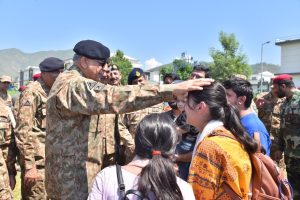Pakistan is struggling to deal with devastating floods, caused by unprecedented monsoon rains across the country. Millions of people have been displaced and infrastructure, including roads, railway lines, and power lines, received extensive damage. People in flood-hit areas suffered immense losses and are without homes, food, water, and electricity.
The Pakistan Army has stepped in to help with rescue and rehabilitation efforts in the wake of the large-scale disaster. Not only is the magnitude of its rescue and relief operations immense, but also it swung into action swiftly.
It is the only institution in Pakistan that is organized and resourced well enough to provide relief in response to a disaster of this magnitude. Hence, it is not surprising that the Shehbaz Sharif government called in the military in August to help in the rescue and relief operations.
The military has established flood relief camps across the country. So far, more than 619 army aviation sorties have flown to far-flung areas of the country to rescue thousands of stranded people. The military has set up more than 300 medical camps to provide free healthcare services and supplies to the people, and over 566,089 patients have been treated so far.
Moreover, the army is assisting civilian institutions with managing international aid operations because it is better equipped to deal with such situations. When national disasters strike, knowing whom to turn to is key. The current chairman of the National Disaster Management Authority is a lieutenant-general; civilians are aware that he is a one-window clearing operation to get all their needs met.
The military leadership has been visiting flood-ravaged areas to show its sympathy for the masses and understanding of their concerns and needs. During a recent visit to a flood-hit town in Baluchistan, Chief of Army Staff (COAS) General Qamar Javed Bajwa said that “the safety and well-being of our countrymen come first and we won’t rest until each one of the flood affected is not only reached but rehabilitated, no matter how much effort is required.”
“The people of Pakistan are our priority and we won’t spare any effort to assist them in this difficult time,” he added.
Such efforts on the part of the military are also aimed at sprucing up its image. This is important, especially at a time when politicians have been promoting themselves at the expense of the military institution.
More so, in an era of online communication, acts of building strong public relations are important for the armed forces to build trust with people and keep their institutional status on par with the public’s expectations. If the military’s public approval ratings are eroded, the institution could come under pressure from many state and non-state actors.
It is commendable that the military establishment has so far shown restraint in the face of the ongoing political chaos in the country. While one can discuss the merits and demerits of its suspected role in politics, it is hard to imagine Pakistan functioning without the military playing a calculated role to ensure that the state’s structure runs effectively.
For instance, former Prime Minister Imran Khan recently accused the Sharif government of trying to appoint a loyalist as army chief. He has also insisted that the tenure of the current army chief, Bajwa, should be extended as the current government doesn’t have the legitimacy to make the appointment. “The government that has the people’s mandate [meaning his Pakistan Tehreek-e-Insaf] should decide the army chief – not those who brought in an illicit government,” Khan said. “I don’t consider that a mandate. So the current COAS should continue.”
Making the army chief’s appointment controversial at a time when Pakistan is passing through a difficult phase in its history does not bode well either for the future of democracy in the country or for the military institution, which acts as a binding force in Pakistan. Moreover, inviting the military to play some sort of role in politics undermines the idea of expecting the institution to be apolitical and stay out of politics as part of the constitutional requirement.
At a time when the Sharif government’s resources are stretched to the limit, it is important that the leaders of Pakistan’s civilian government and the military come together to chart out how the country can get out of this humanitarian crisis. This is a catastrophe like no other and it requires manpower, resources, and expertise, which only a few possess in Pakistan.
The military’s pitching in to carry out rescue and relief operations has significantly eased the burden on the civilian bureaucracy and government. The government should work with the military leadership to fast-track rehabilitation efforts in the country. Now is not the time for politicking.
There will be plenty of time for political posturing in subsequent months.

































